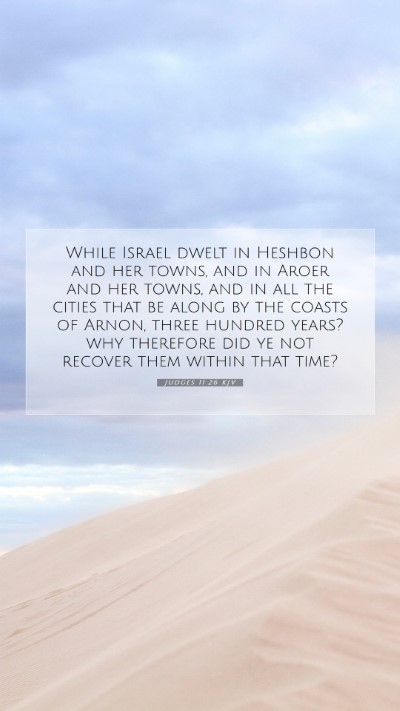Bible Verse Meaning of Judges 11:26
Verse Reference: Judges 11:26 - "While Israel dwelled in Heshbon and her towns, and in Aroer and her towns, and in all the cities that be along by the coasts of Arnon, three hundred years; why therefore did ye not recover them within that time?"
Understanding the Context
This verse occurs during a dialogue involving Jephthah, a judge of Israel, who is confronting the Ammonite king regarding territorial disputes. The verse highlights a historical context wherein Israel had possession of certain lands for an extended period. Jephthah points out the neglect of the Ammonites in reclaiming these lands during the 300 years that Israel had lived there.
Bible Verse Interpretations
Several public domain commentaries provide insights into the significance of this passage:
-
Matthew Henry's Commentary:
Henry emphasizes that Jephthah's argument served to remind the Ammonites of their long-standing inaction regarding the territories that they now claimed. He points out the justness of Israel's claim and invokes the notion of rightful possession through historical inhabitation.
-
Albert Barnes' Notes:
Barnes highlights the rhetorical nature of Jephthah's question, suggesting it was intended to shame the Ammonites into reflecting upon their lack of effort to recover their lands rather than to validate their claims. This interrogation emphasizes the right of Israel to defend the territory.
-
Adam Clarke's Commentary:
Clarke elaborates on the historical aspect, noting the significance of the coasts of Arnon and the geographical territories mentioned. He suggests that Jephthah's reference serves as a way to question the Ammonites’ legitimacy and their past inactivity regarding territorial claims.
Biblical Exegesis and Analysis
In-depth analysis of Judges 11:26 reveals several themes relevant to both the historical narrative and its implications for faith communities today:
- Historical Significance: The mention of "300 years" establishes a timeline that frames Israel's presence and ownership over the land, underscoring the principle of long-term habitation as a basis for rights to territory.
- Rhetorical Strategies: Jephthah uses a rhetorical challenge to provoke the Ammonite king, indicating that genuine claims to lands must be acted upon, not just professed.
- Divine Justice: The passage hints at the broader theme of divine justice, showing how God equips His leaders, like Jephthah, with wisdom and strategy in disputes over territory and legitimacy.
Application of Judges 11:26
This verse can offer valuable lessons for Bible study groups and personal reflection on how we understand and apply scripture in daily life:
- Recognizing Rights: Understanding the historical context of claims can help in guiding discussions about justice and rights in modern contexts.
- Encouragement to Act: Just as Jephthah urges the Ammonites to reflect on their inaction, we are encouraged to take action in areas of our lives where we may have been complacent.
- Faith and Leadership: This passage reflects the importance of divine guidance in leadership roles and the significance of standing firm on rightful claims grounded in history and faith.
Cross References
- Deuteronomy 2:24 - "Rise ye up, take your journey, and pass over the river Arnon: behold, I have given into thy hand Sihon the Amorite, king of Heshbon, and his land; begin to possess it, and contend with him in battle."
- Joshua 12:2 - "Sihon king of the Amorites, which dwelt in Heshbon, and ruled from Aroer, which is upon the bank of the river Arnon."
- Numbers 21:26 - "For Heshbon was the city of Sihon, the king of the Amorites; and in the land of the Moabites."
Conclusion
In conclusion, Judges 11:26 provides a profound view into the dynamics of territorial claims and the responsibilities associated with them. The verse calls upon us to reflect on our own situations and consider how we can address historical wrongs, the importance of rightful claims, and the action we need to take to reconcile and affirm justice in our lives. Understanding this scripture through various commentaries enhances our knowledge and application of Biblical truths.


